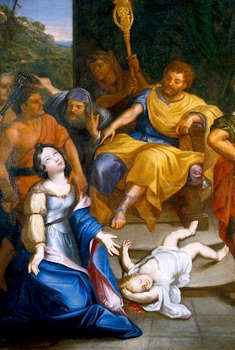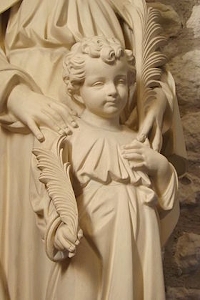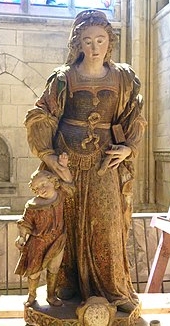Lives of the Saints
Our Models and Protectors
Spiritual Bouquet:
June 16

son Cyricus (or Quiricus)
Saint Julitta and her son
Saint Cyricus (or Quiricus)
Martyrs in †304
Diocletian’s edicts against Christianity quickly spread to Lycaonia, an ancient province of Asia Minor. Domitian, who was governor, executed them with the utmost cruelty.
Not wishing to put her life at risk, Julitta (or Juliet), a wealthy Christian lady from the family of the kings of Asia, left the considerable possessions she had in the city of Iconium to take refuge with her three-year-old son Cyricus in Seleucia (the actual Turkish province of Hatay). Two young maids accompanied them.
As soon as she arrived in Seleucia, she learned that the governor, named Alexander, was also persecuting the Christians; she therefore set out to go to Tarsus in Cilicia. Meanwhile, Alexander entered the city at about the same time as she did. Having been recognized, she was arrested along with her son she was holding in her arms, and was brought before the governor's court. Her two servants fled; but they kept within range, in order to observe at least from a distance the torments and combat of their mistress.
Alexander asked Julitta what her name, her position and her country were. She answered these various questions with these words, "I am a Christian." So the governor, outraged, had her child taken away from her and ordered that she be stretched out and beaten with ox nerves.

It was very difficult to take the innocent child from his mother's arms. The governor took him on his knees and tried to soothe him with his caresses; but Cyricus did not turn his eyes away from his mother. He vigorously tried to rush to her side. He scratched the governor's odious face and kicked him in the stomach. When his mother, in the midst of torment, cried out, "I am a Christian!" he immediately repeated, "I am a Christian!" Then the furious monster seized the child by the foot, and from his seat threw him to the ground, smashing his skull on the stone steps. The innocent victim went to join the celestial procession of the Holy Innocents.
Julitta, having witnessed the scene, thanked God for having granted her son the crown of martyrdom. The joy she showed increased the fury of the judge. He ordered the executioner to hang the Martyr and flay her alive, then pour boiling pitch on her feet. During the execution, a herald cried out to Julitta, "Have mercy on yourself, and sacrifice to the gods; deliver yourself from these tortures, dread the awful death that has just befallen your son."
But the blessed Martyr, steadfast in the midst of torments, raised her voice in turn, and answered with generous constancy, "I do not sacrifice to demons, to statues that are deaf and dumb; but I honor Christ, the only begotten Son of God, the One through whom the Father created all things. I am eager to go and meet my son. It is in the kingdom of Heaven that it will be given me to see him." After this answer, the governor seeing that he could not overcome the courage of his victim, condemned her to be beheaded. He also ordered that the bodies of Julitta and of her son be carried to the place where the corpses of criminals were thrown.

The executioners closed Julitta's mouth with a gag that they violently tied and led her to the place of execution. Julitta asked them by sign for a few moments to pray. The executioners, allowing themselves to be swayed, untied the gag. The Saint knelt down and made this prayer to God: "I thank Thee, O Lord, that Thou hast called my son first, and hast deigned to grant him, for the glory of Thy terrible and holy name, in exchange for a transient and vain life, eternal life in the abode of the Blessed; also receive Your unworthy servant, and may I have the happiness of being reunited with the prudent virgins, to whom it has been given to enter the abode of the celestial spirits, where nothing defiled can penetrate, where my soul will bless God Your Father, the Creator and Preserver of all things, as well as the Holy Spirit, forever and ever. Amen." As she finished her prayer, the executioner decapitated the generous Martyr. Her two servants secretly removed her body with that of her son, and buried them in a field near the city.
A few years after the Holy Martyr’s death, Constantine the Great brought all the persecutions directed for so long against the Christians to an end, by declaring himself a disciple of Jesus Christ. One of the servants of Saint Julitta was still alive; she made known the place where she had deposited the bodies of the Holy Martyrs. We read in their Acts that, after this discovery, "The faithful of the country hastened to obtain some portion of their relics, hoping to find in them a safeguard against the hardships of life, and went in crowds to their tomb to glorify God."
Translated from the French O.D.M. summary, Mgr Paul Guérin, Les Petits Bollandistes, Vies des Saints, Paris, Bloud et Barral, libraires, septième édition, 1876, T. VII, pp. 72-76.